PHOENIX — The state House is set to debate a proposal that could be an alternative, broader version of an effort to ban texting while driving.
Senate Bill 1141 would create the offense of “distracted driving.”
It would allow police to stop and ticket a motorist who was doing something unrelated to driving if it creates an “immediate hazard” or the person does not exercise “reasonable control” of the vehicle.
But several lawmakers are balking, suggesting the language is so broad that it would provide new excuses for police to pull someone over who is really not a danger.
Sen. J.D. Mesnard, R-Phoenix, proposed the measure after opposing the texting ban.
The texting ban would make it illegal for motorists to send and receive text messages unless they are pulled over or at a stoplight. It also would forbid handling a phone to take calls, requiring the use of a hands-free device.
The problem, said Mesnard, is that it focused solely on what the driver is doing, regardless of whether there is a hazard created.
He proposes to turn that around, with the question being whether whatever the driver is doing — talking on the phone, putting a CD in the audio system, putting on makeup, yelling at the kids in the back seat — actually creates a hazard.
Put another way, the simple act of doing any of those things, including using a hand-held cellphone, would not be a violation without some specific effect on the motorist’s driving.
That, however, led to questions by members of the House Transportation Committee, which considered the plan last week, of whether there is the need for a new law at all.
“We already have laws on the books dealing with reckless driving, driving erratically, driving in a manner that’s not safe,” said Rep. Noel Campbell, R-Prescott, who chairs the panel. “What does this give us that we don’t already have?”
But Mesnard said the reckless driving law is aimed at much more dangerous conduct, requiring police to show that a vehicle was being operated “in reckless disregard for the safety of persons or property.”
In fact, violations of that law, unlike most other traffic laws, carries a criminal penalty of up to four months in jail and a $750 fine.
There are other laws covering things like driving at an excessive speed. Mesnard said they could be used if an officer believes that someone was going too fast in a given situation, including being distracted.
But the bigger question for some legislators deals with the breadth of the proposal and what they called potential for abuse.
“For example, having your dog in your lap and then you swerve to avoid a pothole,” said Rep. Richard Andrade, D-Glendale. “You could be pulled over for distracted driving for the simple fact you have a dog in your lap.”
Ditto, he said, for someone reaching over to grab a soda from the cup holder.
Andrade said that, the way the measure is written, it wouldn’t even require that the vehicle be in motion.
Consider, he said, a situation where the baby in the back seat drops the bottle and the driver, while at a light, reaches back to pick it up.
“That could be distracted driving because, once you get going, you delayed traffic for a few seconds,” Andrade said.
Rep. Leo Biasiucci, R-Lake Havasu City, questioned the latitude of the phrase “immediate hazard,” one of the triggers for police to be able to pull someone over.
“If they see someone with a phone in their hand, they’re driving the speed limit, they’re not swerving, could that still be seen as an immediate hazard because the officer feels that he or she might eventually swerve and get in an accident?” he asked. “It makes me a little nervous because it’s a broad range here.”
Mesnard suggested there’s no basis for that concern.
“It’d be difficult for (police) to say ‘they were an immediate hazard’ just because they had a phone in their hand,” he said, adding that the rest of his proposal makes reference to whether the person is in control of the vehicle. That, said Mesnard, implies that the driver “could hurt somebody” by what they’re doing.
And he said the two-part test in the legislation should be sufficient to keep the focus — and the enforcement — narrow.
First is whether the motorist is engaged in any activity “that is not related to the actual driving of the motor vehicle.” That activity also would have to be “in a manner that visibly interferes with safely driving the motor vehicle.”
In order for police to pull someone over, they also would have to believe that the vehicle was being operated “in an immediate hazard to a person or property” or that the driver “does not exercise reasonable control ... necessary to avoid colliding with any object, person, vehicle or other conveyance on, entering or adjacent to the highway.”
Rep. Kevin Payne, R-Peoria, said he personally likes the fact that the proposal is broad, focusing on more than just the use of a phone or other electronic device.
Rep. Bob Thorpe, R-Flagstaff, agreed there is a need to put some constraints on people who are supposed to be controlling a vehicle.
“You’re reaching for the baby bottle, you’re trying to grab that doughnut, you’ve got that dog on your lap, and you kill somebody or you do thousands of dollars worth of damage,” Thorpe said.
“Your job when you’re behind the wheel is to keep that vehicle safe and not to harm other people,” he said.
Thorpe also said he’s not concerned about giving too much discretion to police.
“We need to make it where it’s enforceable,” he said.





